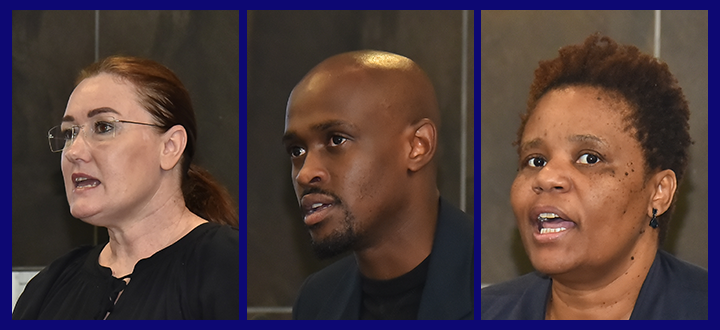News & Media
‘Higher education remains a privilege 30 years into democracy’
The Department of Transformation and Leadership (DTL) recently hosted a seminar reflecting on changes in the higher education sector since South Africa became a democracy in 1994. Themed Reflections on the role of the higher education project on enhancing the human rights endeavour 30 years into democracy, the seminar focused on the changes, achievements, and fractures in the higher education sector, and how these infringe on human rights.
In her presentation titled “Surviving and thriving – an analytical structure to advance transformation”, panellist Professor Lee Stone, Associate Professor in the Department of Public, Constitutional and International Law under the College of Law, drew inspiration from American activist, Martin Luther King’s “Letter from Birmingham City Jail”. She proposed four methodological steps that can assist in achieving transformation as King did while advocating for revolution. Stone also listed facts highlighting where injustices or human rights violations exist and how to address these violations.

From left: Prof Lee Stone, Nkosinathi Mabilane, and Prof Grace Khunou
Additionally, Stone mentioned methodologies that university students can use to fight systematic barriers. She stated: “University students are the vehicle that can promote transformation due to their proclivity and inquiring mentality.” She added: “They also have the opportunity to think critically and apply new knowledge.” However, according to Stone, the higher education sector has not fully achieved transformation even though initiatives such as the National Student Financial Aid Scheme (NSFAS) have increased access to education, the rise of student protests such as the #FeesMustFall and #RhodesMustFall movements indicate that the legacies of colonialism and apartheid still exist. She further added: “Some university students refer to apartheid as the imposter syndrome as they feel that it denied the generations before them access to education.”
Nkosinathi Mabilane, President of Unisa’s National Student Representative Council, maintained that the economy has not been developed enough to create opportunities for graduates, as well as empower them with relevant knowledge and skills. He added: “Government has not created a conducive learning environment where students do not have to worry about shelter, food, and book allowances, among other challenges, which lead to an increase in sociological and socio-economic issues such has unemployment.” In addressing access to education, Mabilane said that NFSAS should consider funding postgraduate qualifications to enable students’ growth, as the current funding model only funds until undergraduate level. “Lack of finance has the potential to demoralise students from achieving their academic goals,” he said. Furthermore, Mabilane highlighted that higher education and transformation serve as catalysts beyond the rights to access, inclusivity and diversity of marginalised groups.”
Reflecting on student issues, Mabilane said that even with the constant fight for free, decolonised higher education, education is still a commodity and those that access it at tertiary level, are privileged. He noted: “There is capacity issues at higher education institutions, forcing some matriculants to take gap years, and the government has not built any university in the past 30 years of democracy.” According to Mabilane, the language of instruction that largely accommodates English and Afrikaans-speaking people, continue to be measures of exclusion. Mabilane also reminded the audience that South Africa’s 30 years of democracy runs concurrently with the commemoration of Rwanda’s genocide of April 1994.
During the question-and-answer session, Professor Grace Khunou, Acting Executive Director of Unisa’s Department of Transformation and Leadership, concluded: “We need to further interrogate why our education system does not equate to employment and economic opportunities, and contrarily, also contributes to the unemployment rate.”
#Unisa150
*By Dineo Khayemba, Journalist, Unisa Radio
**Photography by Shooheima Champion, Unisa Multimedia Centre
Publish date: 2024/03/26

 Unisa co-hosts G20 community outreach in the Eastern Cape
Unisa co-hosts G20 community outreach in the Eastern Cape
 Unisans gain membership of prestigious science academies
Unisans gain membership of prestigious science academies
 Advocating for disability transformation through servant leadership
Advocating for disability transformation through servant leadership
 Unisa Press continues to illuminate the publishing space
Unisa Press continues to illuminate the publishing space